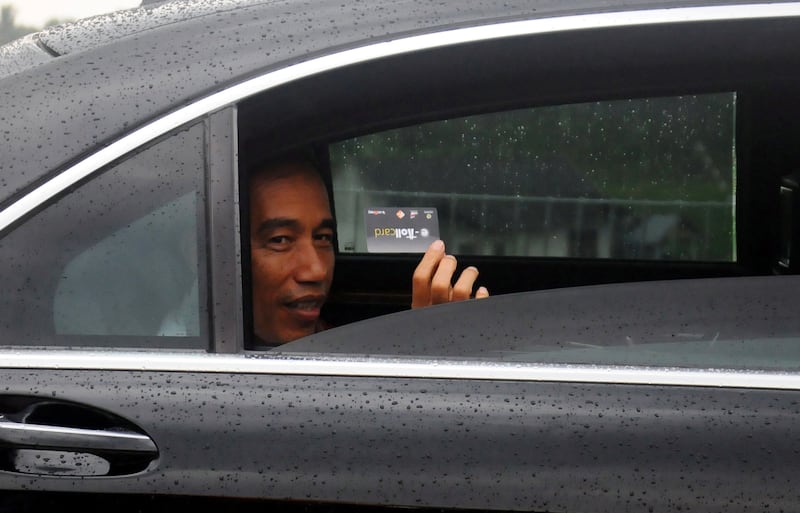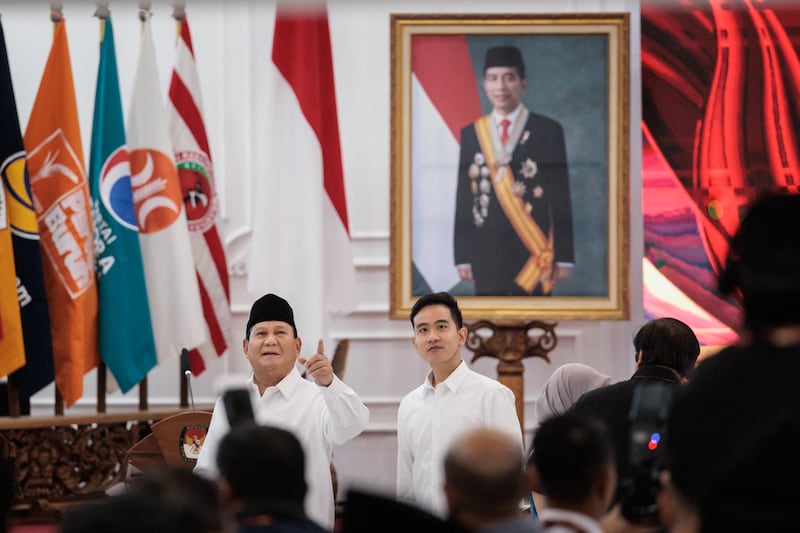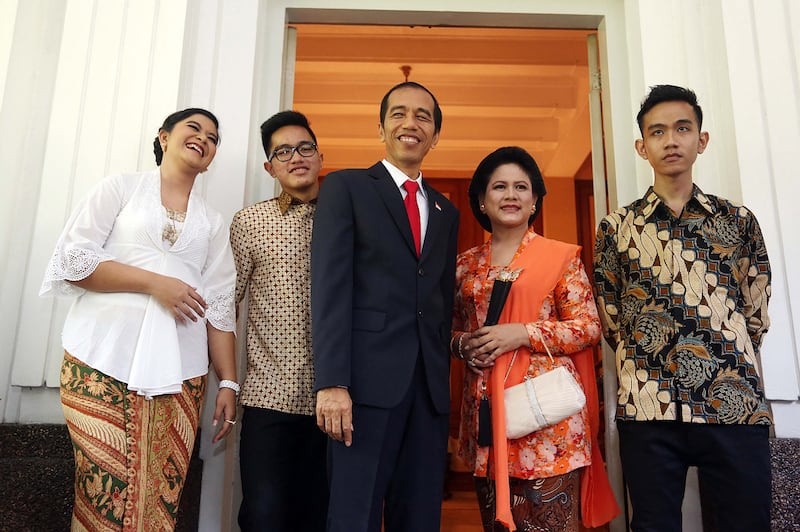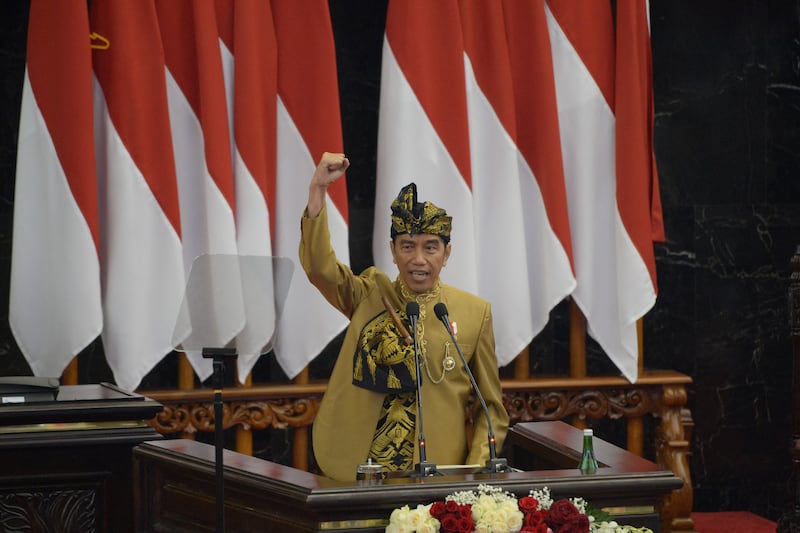As Indonesian President Joko “Jokowi” Widodo prepares to exit office in October, his decade-long leadership is coming in for a reckoning.
On the verge of completing the maximum-allowed two presidential terms, he is set to deliver his final State of the Nation address on Friday.
Jokowi, who rose from humble beginnings as a furniture businessman to become the mayor of Solo (Surakarta) and later the governor of Jakarta, became known for his “blusukan” – unannounced visits to neighborhoods and marketplaces.
This hands-on approach won him widespread support as he positioned himself as an outsider to Indonesia’s political elite. And he had gained a reputation as a clean and efficient leader.
Jokowi won the presidential election in 2014 on the strength of this reputation and by vowing progressive reform – his main promise was to root out widespread corruption.
He said he planned to start large infrastructure projects, raise economic growth to 7%, clean up the environment and improve the human rights situation.
And he delivered – up to a point, analysts told BenarNews.

In 2019, Jokowi became the country’s first civilian president to complete a full five-year term.
His administration is admired for its ambitious infrastructure drive, but critics argue that these achievements have come at the cost of democratic values, environmental sustainability and the strength of state institutions.
His government has vastly improved connectivity across the sprawling archipelago, Asrinaldi, a political analyst at Andalas University in Padang, told BenarNews.
“Jokowi’s efforts to bridge the vast distances between Indonesia’s islands, especially in regions that had long been neglected, deserve recognition,” said Asrinaldi, who goes by one name.
While campaigning in 2014, Jokowi had said infrastructure projects would be the vehicle for growth.
“We sought to enhance our competitiveness through these infrastructure projects, ensuring that their benefits are felt directly by the people,” Jokowi said during a discussion in late July about his administration’s infrastructure achievements.
He also cited Indonesia’s improvement in the World Competitiveness Ranking, to 27 this year from 37 in 2014.
However, Jokowi’s promise to root out graft notwithstanding, Indonesia is more corrupt now than when he took office, according to watchdog group Transparency International’s Corruption Perception Index.
The country's position on the group's 2023 Corruption Perception Index is 115 of 180 nations. Its 2014 rank was 107 of 175 nations. Jokowi took office in October 2014.
Critics point to a 2019 legislation that placed the Corruption Eradication Commission (KPK) under presidential oversight, raising concerns about the integrity of Indonesia's democratic governance.

A recent special edition of the influential Indonesian magazine Tempo contrasted the initial optimism of Jokowi’s 2014 election victory with concerns about the erosion of democratic practices during his time in office.
Titled “Jokowi’s 18 Sins,” the reports accuse the president of employing authoritarian tactics to consolidate power.
They cite instances where Jokowi appeared to manipulate laws and influence judicial appointments to further his political objectives.
“The signs of democratic backsliding … are increasingly evident in Indonesia,” one Tempo article said, adding concerns about the erosion of civil liberties.
Critics argue that the two Jokowi administrations increased surveillance, cracked down on dissent, and restricted free speech and assembly, which have led to a shrinking space for civil liberties in the country.
In 2023, a Constitutional Court ruling, which many believe was tailored to accommodate Jokowi’s eldest son Gibran Rakabuming Raka, fueled debate over the fairness of Indonesia’s political system and the influence of familial ties.
Gibran, just 36 years old, was able to run for vice president because of a controversial ruling that lowered the age requirement for presidential and vice presidential candidates who have held elected office.
Soon after, Jokowi was accused of attempting to build a political dynasty, a concept he had disparaged in the past.
Ineligible to run for a third term because of constitutional limits, Jokowi had tacitly endorsed Prabowo. And in what many see as returning the favor, Prabowo chose Gibran as his running mate.
In the Feb. 14 general election, the duo won nearly 60% of the vote.

Environmental and human rights activists have been vocal in their criticism of Jokowi’s administration.
Usman Hamid, executive director of Amnesty International in Indonesia, accused the president of causing “extraordinary environmental damage” through the large-scale exploitation of natural resources, particularly in eastern Indonesia.
“Jokowi’s focus on infrastructure and economic development has come at a high cost to human rights and environmental preservation,” Usman told BenarNews.
For instance, while the government and its supporters tout the benefits of nickel mining, a key component of Jokowi’s economic strategy, it has been criticized for causing deforestation, polluting water and destroying marine ecosystems due to the industry's waste disposal practices.
Pradarma Rupang, an activist with the Mining Advocacy Network, said “the environmental crisis is monumental and has worsened significantly.”
“The damage is so extensive that it seems there is no plan to restore it. It feels like he is leaving behind a legacy of destruction,” Pradarma told BenarNews.

Jokowi’s ambitious and controversial project to build a new capital city, Nusantara, on the island of Borneo, has also faced sharp criticism.
The project in East Kalimantan province has been blamed for water shortages and deforestation in critical areas of the province. It has also been dogged by construction delays, land acquisition obstacles and a demonstrable lack of investor interests, public policy experts say.
Despite these controversies, Jokowi remains a popular figure in Indonesia. Recent polls show his approval rating around 76%.
Rumadi Ahmad, a senior Presidential Staff Office adviser, dismissed these and other criticisms without specifically addressing them.
“It’s not a problem,” Rumadi told BenarNews. “In fact, it shows that democracy is still alive.”
On Aug. 1, in a rare moment of public reflection, Jokowi apologized for any shortcomings during his time in office. He was addressing a prayer event at the presidential palace.
“Vice President Ma’ruf Amin and I sincerely apologize for any mistakes we may have made while fulfilling our duties as leaders of the Republic of Indonesia,” Jokowi said.
“We recognize that as human beings, it is impossible to please everyone or meet all expectations.”
Pizaro Gozali Idrus in Jakarta contributed to this report.
